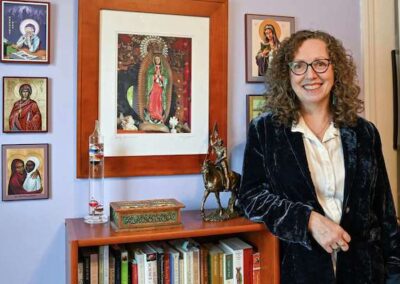When the doorbell rang the other afternoon, my first inclination was to pretend no one was home. Surely someone was selling something I didn’t want. But I caught a glimpse of a little old lady on my doorstep and figured I should see what it was all about. When I got closer, I immediately recognized her as the woman who came by last year collecting for the annual CROP walk. I remembered her not only because she was very old and very slow and yet very determined in her efforts to raise money for Church World Service but because she has Alzheimer’s and she seemed confused and lost as she wandered down our street.
Her condition had clearly worsened over the past 12 months. Dressed in a bright red windbreaker about five sizes too big with a tan canvas hat pulled down over her white hair, she stood there and held out a piece of paper with her name and address on one side and the name of Church World Service on other. She couldn’t even remember why she was standing at my door. When I asked if she was collecting for the CROP walk, she looked relieved that she didn’t need to remember her sales pitch. I took her “card” and asked if I could drive her home, but she insisted that she needed to finish the street and get rid of all her sponsorship cards. So I said good-bye and told her to be careful, explaining which houses she should skip so she didn’t waste precious steps just to find no one at home.
When I went to pull the car out of the garage about 15 minutes later to take Chiara to dance class, Jeanne was standing at the front door of the house across the street that I had told her to skip. She looked around, confused, and then started heading back to our house. I got out of the car and reminded her that she had already been to my house, begging her to please let me drive her home. But, no, she wouldn’t hear of it. So I once again turned her around and aimed her in the direction of two houses with retirees at home, hoping that they, too, would make sure she kept moving in the right direction.
I brought Chiara to dance class a mile or so away but couldn’t get Jeanne out of my head. I kept imagining her taking a wrong turn or walking out in front of a car. So I left the dance studio and retraced my steps, looking for signs of the bright red coat. Sure enough, only two houses down from ours, she was standing silently on another front porch, waiting for someone, anyone to answer. I pulled my van up next to the house and called to her. I told her that I wasn’t leaving until she let me drive her home since I was going her way anyway (I only knew her address because of the little slip of paper she’d handed me earlier). She finally agreed and I got out to help her into the car, buckling her frail body into the seat. We drove a few blocks to her street and she asked me to let her out on the corner, but I wanted to be sure she made it to her driveway. As we pulled up near her house, she said, “My husband is going to be so mad if he knows I was lost again.” So I told her we’d just tell him that she was done with her fund-raising and I was going her way anyway.
But, as soon as her husband saw her get out of the van, it was clear this wasn’t an unusual event. He thanked me for bringing her home, saying, “She doesn’t listen,” and smiling at Jeanne as she started toward him. I told Jeanne to have a good day, and she said, “My day is already good because I met you.” And that right there — those few simple words — had me smiling for the rest of the afternoon. I promised Jeanne I’d stop by the next time I was out for a walk past her house, and she encouraged me to do just that. But I know that if I see Jeanne tomorrow or next week or next year, she won’t have any idea that we’ve ever met before. To Jeanne, I will always be someone new, a friendly stranger. And to me, Jeanne will always be the lovely little woman with a will of steel and a heart of gold. I hope I have even half her courage and determination if I find myself walking a similarly daunting and confusing path one day.







